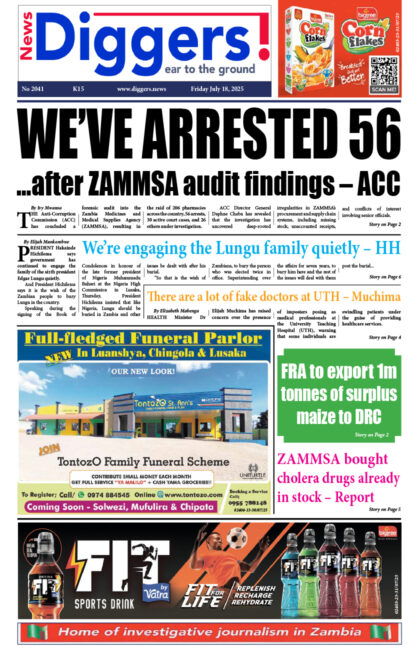THE Auditor General’s report on the accounts of Parastatal Bodies and other statutory institutions for the financial year ended 31st December 2018 has revealed that Independent Broadcasting Authority IBA Director General Josephine Mapoma and IBA director of standards and licensing Eustace Nkandu purchased company cars at residual values.
According to the employment contracts of the Director General and Director of Standards and Licensing, they were eligible to purchase vehicles at the end of contracts at 25 percent of their original value.
The Report revealed that the vehicles were purchased at K355,000 and 285 000 in 2014 and were expected to be sold at K88,750 and 71,250 but were sold at a residual value of 17,750 and 14,250 which resulted in a loss of K128,000.
“A scrutiny of the contracts of employment for the Director General and Director Standards and Licensing revealed that the employees were eligible to purchase the vehicles at the end of the contracts at 25% of the original purchase prices. The vehicles were bought on 2nd April 2014 and had been used for four (4) years as at 22nd October 2018 when they were disposed of,” the report read.
“However, a review of Board Minutes, personal files and receipt books revealed that during the period under review, the Authority sold two (2) motor vehicles to the Director General and the Director Standards and Licensing at residual values instead of 25% of the original purchase prices as provided in their contracts resulting in a loss of K128,000.”
The Report also stated that IBA failed to remit K1,698,231 to the Zambia Revenue Authority in terms of PAYE.
According to the report, the Authority also failed to produce the annual report for the year 2018.
“Section 42 (1) of the Independent Broadcasting Authority Act states that as soon as is practicable, but not later than three (3) months after the financial year, the Authority shall submit to the Minister a report concerning its activities during that financial year. Contrary to the Act, as at 31st December 2019, the Authority had not produced the Annual Report for the year ended 31st December 2018. Therefore, the performance of the Authority could not be assessed,” the report read.
“Non-remittance of Tax Contrary to the Income Tax Act Chapter 323 of the Laws of Zambia, Pay As You Earn (PAYE) in amounts totalling K1,698,231 deducted from employees emoluments during the period under review were not remitted to the Zambia Revenue Authority as at 31st December 2018. On 30th November 2018, the Manager – Licensing and Compliance resigned from IBA. At the time of his resignation, he owed the IBA amounts totalling K81,000 in unrecovered loans and advances. However, as at 31st December 2019, management had not taken action to recover the funds. In this regard, IBA may not recover the outstanding amounts.”
The Report further stated that IBA did not have a mechanism in place for verifying the correctness of the TV levies remitted by the licensees.
“The Independent Broadcasting Authority (Television Levy) Regulations, 2018 gives power to the IBA to collect Television Levy from licensees at the rate of K5 per subscription. A scrutiny of accounting records revealed that IBA collected a total amount of K33,604,270 from seven licensees from 1st May 2018 to 31st December 2018. However, it was observed that IBA did not have a mechanism in place for verifying the correctness of the TV Levies remitted by the licensees. In this regard, it was not possible to verify the correctness of the K33,604,270 collected from the seven licensees,” the Report read.
“Section 22 (4) of the Independent Broadcasting Authority (IBA) Act No 26 of 2010 states that a broadcasting licensee shall pay such annual fees for the broadcasting license as may be determined by the Board. A review of the records in respect of radio and television fees billed in 2018 revealed that six broadcasting stations had not paid license fees in amounts totalling K63,500. The amounts had been outstanding for 19 months as at 31st December 2019.”
The Report further stated that the Authority failed to adopt to Information and Communication Technology standards and frameworks.
“Internationally and generally used in the implementation, operation and auditing of Information and Communication Technology (ICT) environments. However, despite the availability of various frameworks which the Authority could have utilized or adopted, the Authority did not adopt any ICT Standards and frameworks for managing its ICT operations during the period under review. As a result, the Authority did not have a documented basis or systematic means for benchmarking or measuring the performance of its ICT activities or processes. Consequently, it was not possible to establish how the Authority identified, improved and modified any weaknesses in the various ICT control areas,” read the report.
” States that an ICT Steering Committee (or equivalent) composed of executive, business and ICT management should be established in an organisation. Contrary to the standard, the Authority implemented ICT systems such as the Client Information System, Payroll and Pastel systems valued at K47,625 without constituting an ICT Steering Committee or its equivalent to oversee and monitor the Authority’s ICT projects and activities.”



















